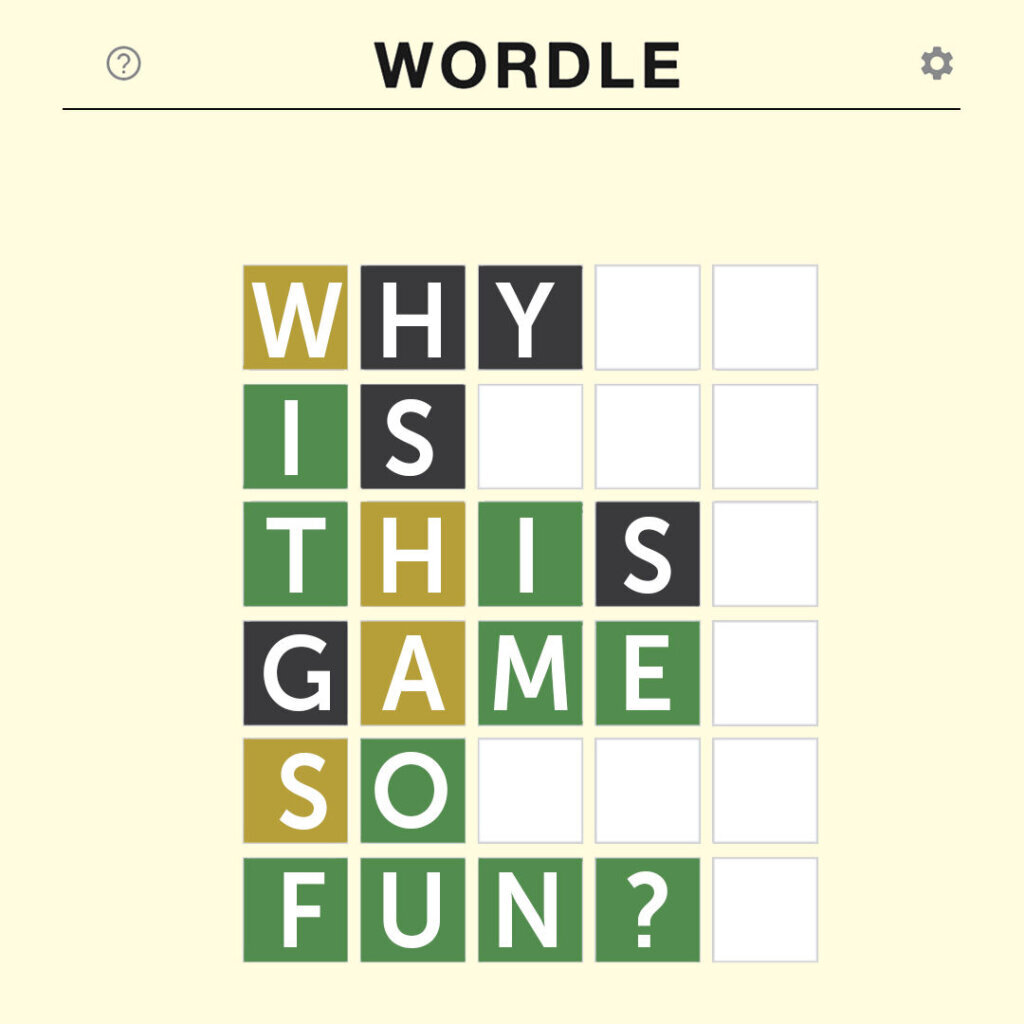 Let’s get to the disclaimer first: It was literally during my conversation with Dr. Aditi Subramaniam about the appeal of Wordle — the word game that has grown from 90 users last November to around 2 million — that the news broke that it’s been sold to The New York Times Games section.
Let’s get to the disclaimer first: It was literally during my conversation with Dr. Aditi Subramaniam about the appeal of Wordle — the word game that has grown from 90 users last November to around 2 million — that the news broke that it’s been sold to The New York Times Games section.
We can all feel happy for Josh Wardle, the Brooklyn-based developer who reportedly got a payday in the low seven figures for a game he made to keep his partner entertained during the pandemic, and at the same time ask, “What does this mean for Wordle?”
(Translation: Will The New York Times ruin Wordle?)
Well, there’s a lot to ruin, starting with the organic appeal.
“I don’t think any of this was actually designed … to be this appealing,” Subramaniam said. “It’s just something that seems to have happened serendipitously.”
Wardle is on record as saying that, in creating Wordle, he basically did everything that someone bent on creating a viral game would not do. And Subramaniam, a neuroscientist, said the lo-fi facets of Wordle — the lack of ads; the simple website — make up a large part of its appeal.
Indeed, Wardle told Time just before the sale that he felt the popularity of the game “demonstrated that the internet could be about something other than money.”
(Oh, and did we mention it’s free and not behind a paywall, and that The New York Times has portentously announced that the game will “initially” remain free?)
People can feel when they’re being worked on in a maximum-income-generating way, and that creates a distance, much in the way an ad can be cool, but still it’s, you know, an ad.
“Any game on the internet, or even social media, actually, is kind of designed to keep you coming back, and it kind of plays on our addictions in a way,” Subramaniam said. “So it’s very refreshing to see that there’s a game out there that isn’t trying to do that; in fact, it’s trying to work the opposite way.”
(Hear that, New York Times?)
She said the game calls back to vintage pen-and-paper games such as hangman, and its one-a-day nature, with no archive to binge on, simultaneously feeds what’s known as the scarcity principle (we want something more if it’s rare) and avoids the variable reward system.
“Social media companies withhold likes, for instance, and release more likes in bursts. Because the variable reward system says if we get a reward when we’re not expecting it, it gives us that much more of a dopamine hit. So in a way, the unexpected nature of the reward is rewarding in itself.”
That gets people hooked, and not in the fun way: Most games are “almost designed like a slot machine in a way,” Subramaniam said. “It’s not something that just happens to be addictive; it’s something that’s designed to be addictive.”
Also, let’s face it — it’s generally not that tough. You have six tries to guess a five-letter word, and after each guess, each letterbox turns gray (meaning this letter isn’t in the word), yellow (this letter is in this word but not in this spot) or green (this letter is in this spot in the word). It only asks five to 15 minutes of your time, making it an easy habit to fit into your daily routine without the temptation to binge.
“I can imagine, if there were multiple words every day, I don’t think it would have the same amount of success kind of drawing in the crowds over and over again,” Subramaniam said.
(Hear that, New York Times?)
Wordle is social as well — the ability to share how you did without giving away the day’s word makes it a perfect game for an era of instant, social communication, even over long distances (and across many time zones). Subramaniam said her family shares their Wordle results over a group chat — which may sound like shallow communication, but it’s still daily communication.
By the way, she said her first word was usually RAISE, and that she follows it up with POUND, following the strategy of making your first two words as different as possible, to scoop up as much information as you can.
Every trend comes to an end, but Subramaniam thinks the Wordle fad will stick around longer than most — again, because of the one-word-a-day principle and the relative ease of use.
“I remember during the beginning of the pandemic, everyone was into baking bread,” she said. “And I think that lasted a month, because for one, it’s labor intensive … but when it comes to Wordle, I can anticipate people remaining engaged with it because it doesn’t demand quite so much of us.”
Subramaniam writes on neurology from a parenting perspective, and said any kid who gets hooked on Wordle is not on a bad path. “I wouldn’t really mind her getting hooked on Wordle, I think.”
But of course, that’s up in the air now, thanks to last week’s announcement. Wordlers will all have to wait with fingers crossed, waiting to see whether the Times _ _ _ _ _ this up.








